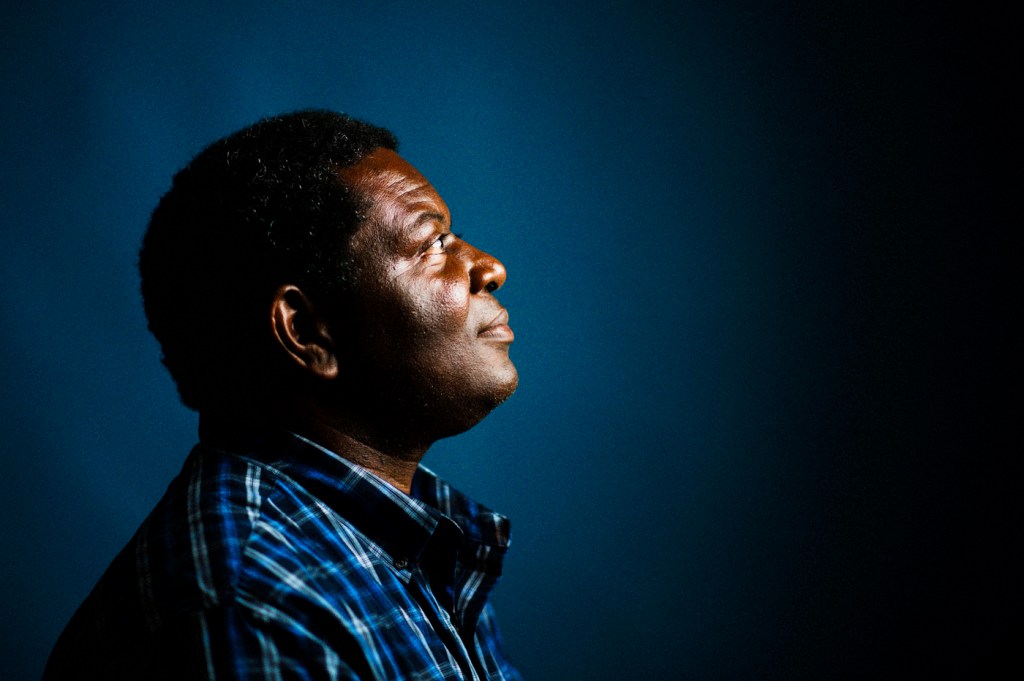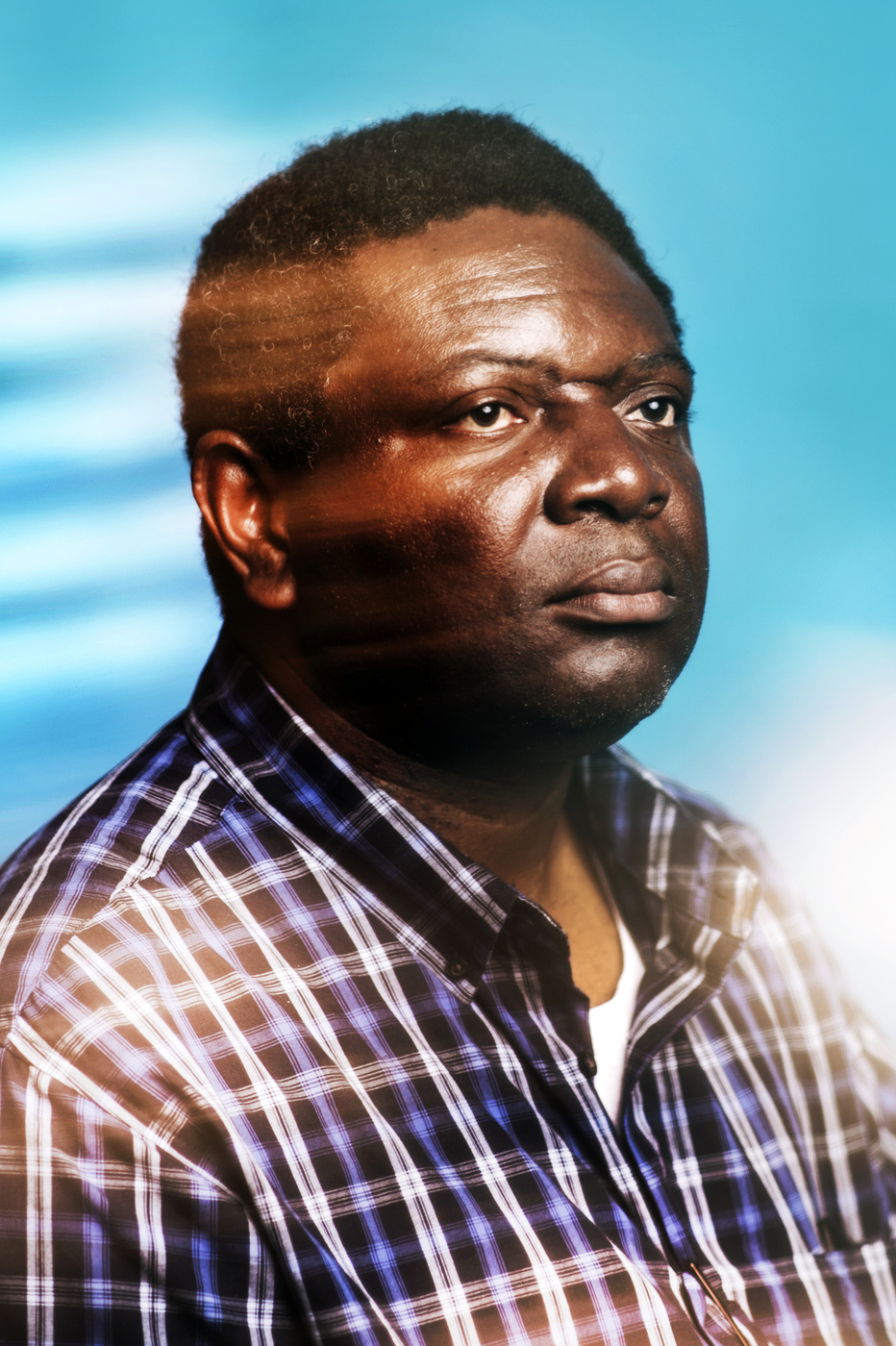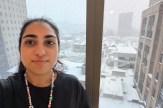‘There’s no way I’ll be silenced’

“Where is the lawyer? Where is the lawyer?” a swarm of men shouted at the car. Alfred Brownell, the lawyer, was identified. The men began beating the car, rocking it, trying to smash the windows. They shouted, frenzied, that they would kill Brownell, that they would cannibalize him, that they were planning other unthinkable violence. They wanted him dead. All because he was fighting to protect the land rights of a string of indigenous communities—facing down, in the process, the Liberian government and a wall of powerful palm oil companies itching to raze the very same forest for profit.
Brownell and those in the car with him escaped the nightmare that afternoon, but he found himself the target of a national manhunt nonetheless. His persecution forced him and his family to flee the country with only the clothes they were wearing, ultimately headed for a flight to Boston in mid-December, 2016. This January, he began a yearlong tenure as a visiting scholar in the Northeastern University School of Law’s Program on Human Rights and the Global Economy. Here, Brownell is teaching and mentoring students by sharing with them his experience and his knowledge of human rights and environmental law.
His story begins much earlier, though.
The lungs of West and North Africa
He grew up in Liberia, a country, he says, that’s “blessed and endowed with a lot of resources” for its relatively small population. There’s oceanfront, plenty of rainfall and water for the forest, buried mineral resources, and a history of being the first independent country in Africa, he said.
Perhaps chief among those resources is the forest in Liberia—a section of the Upper Guinean forests that stretches from Guinea and Sierra Leone through Liberia, Cote d’Ivoire, Ghana, and Togo.
This forest, as Brownell described it, is “the lungs of West and North Africa,” the source of oxygen in an otherwise desert landscape. The World Wide Fund for Nature designated the Upper Guinean forests as one of its Global 200 critical regions for conservation. Liberia, Brownell added, is home to the largest section of this forest that remains.
Despite that richness, the average life expectancy in the country is in the low 60s, the rate of unemployment and poverty high.
“Most people live on less than $1 a day,” Brownell said. “Knowing the country’s background, it makes you wonder what’s going on.”
As he grew up, Brownell became more and more aware of this divide between how life should have been, and how it really was. He struggled to understand how a country so rich in resources could be home to a population that sees almost no benefit. It made him angry; he wanted to change things. So, he went to the Louis Arthur Grimes School of Law, University of Liberia, and committed himself to studying the type of human rights and environmental law that was going to arm him with the knowledge to make real change in his country.
This was home for people; this was where they got their food, their livelihood, their culture, this represented the history of who they are; it defined them and their very existence, their value system—all of that tied to the land.
Alfred Brownell
School of Law visiting scholar
Indeed, right out of law school, Brownell helped write framework environmental policies that would serve to protect and conserve Liberia’s piece of the Upper Guinean forests, as well as protect the livelihoods of the communities found in and around the forest; communities that depended upon it for, well, everything.
“People were living on the land, surviving off the land—these were people have use for the land, people for whom the land meant a lot more than whatever vision the government had for it,” Brownell said. “This was home for people; this was where they got their food, their livelihood, their culture, this represented the history of who they are; it defined them and their very existence, their value system—all of that tied to the land.”
Brownell, 52, who has a low, rhythmic voice and a methodical way of explaining complex problems, became impassioned as he recounted the importance of this land. His voice cracked with incredulousness, with frustration, with anger, over this fight to which he’s dedicated his life.
Brownell was involved in creating policy and laws that set aside wide swaths of the forest for conservation, that protected the rights of local communities; he helped create two large, resilient networks of communities dedicated to sustainably manage the forest—laws that were built from scratch, that had never been on the books before.
David and Goliath
Slowly, though, the Liberian government began to undermine these policies.
“The government proceeded to give away the same forest areas that we had struggled to protect,” Brownell said. “They started to award this forestland to mining companies, to agricultural companies, and to logging companies. They weren’t consulting the communities, they weren’t doing environmental impact studies, it was an official sitting up in his office, saying to these companies, ‘Here’s five million acres of land, go take that.’”
Some of the biggest of those awards went to multinational companies that would clear-cut the land to set up palm oil plantations, around 2009. By that time, Brownell and several lawyer colleagues had established Green Advocates International, Inc., Liberia’s only not-for-profit public interest environmental law organization.

This January, Alfred Brownell began a yearlong tenure as a visiting scholar in the School of Law’s Program on Human Rights and the Global Economy. Photo by Adam Glanzman/Northeastern University
Green Advocates began investigating the practices of these palm oil companies, and filed several complaints against some of the largest companies that detailed collusion with the government, inadequate compensation for locals, destruction of local burial grounds, and contamination of drinking water.
Eventually the Roundtable on Sustainable Palm Oil, or RSPO—a voluntary group of growers, processors, and nonprofit organizations that certifies the production of palm oil to ensure sustainable practices—began to take notice. Their own investigation concluded that Green Advocates’ complaint had merit, that indeed, policies had been ignored and rights violated.
Green Advocates and the local communities that were impacted set out to negotiate with the palm oil companies to create a better working relationship. This is where things intensified for Brownell.
He suspects that these companies, stymied in their frenzied push to produce palm plants, began complaining to the Liberian government about the holdup. Brownell said he was “invited a couple times” to withdraw his complaints, but refused each time.
Shortly after, he was branded as anti-government, anti-development, anti-citizen by government officials in the press. He began to notice strange cars following him. His law office was burglarized; valuable technology left untouched, but legal documents stolen. His phone was tapped. Certain government officials made statements that they “couldn’t guarantee (his) safety if (he) traveled to their counties,” Brownell said.
Swarmed, threatened, forced to flee
The situation exploded in 2014.
That year, a group from the RSPO—the palm oil oversight body—visited Liberia to verify that the companies were indeed complying to the negotiated processes established after Green Advocates’ complaint. A caravan of people that included RSPO representatives, government officials, palm oil company representatives, Green Advocates staff, and a journalist, was traveling back from the remote forest they’d been inspecting when Brownell’s car was stopped by a manmade roadblock.
In retelling his story, Brownell paused here. It was clear he was miles from the air-conditioned Law Library office where he sat, miles from the rumble of a train passing through Ruggles right outside his window. He was back on a rural stretch of road in Liberia, his car surrounded by the throb of an outraged, armed mob.
It was a crew of the palm oil company’s private security (something which the company disputed in subsequent media coverage of the event) that put up the roadblock, Brownell said, effectively trapping him and his colleagues.
“They were searching for me in particular,” he said. “‘Where is the lawyer,’ they said, ‘We’re looking for the lawyer.’” Brownell described 150 men, dressed for war with chalk on their faces, armed with machetes, stakes, guns.
They began hitting the car, threatening to burn it down. They tried to pull the handles off the doors.
“When they realized I was in the car, they started to sing with joy, like they had found a prize,” Brownell said. “They said they were going to cannibalize me, they were going to rip out my heart, cut off my head.”
Two of Brownell’s colleagues fainted. He just kept praying, he said, “to protect us.”
There’s an urgent need to continue to defend those who are protecting human rights. I’m confident in this cause with my very life and my very blood. There’s no way I’ll be silenced.
Alfred Brownell
School of Law visiting scholar
They brought over a local chief to demand that Brownell get out of the car. The chief walked up to the car, looked Brownell in the eye, and told him he couldn’t stop the men from killing Brownell, but he wasn’t going to let it happen in his county. He told the men to bring it somewhere else.
Chaos ensued. In it, one of the men accidentally hit the chief, prompting a response from people in the community. In the fracas, a few of the local people removed the roadblock, allowing Brownell and his colleagues to escape to safety.
Things didn’t end there for Brownell, though. In late 2016, a nearly statewide government-led manhunt broke out, with him as the target. The search, which ultimately ballooned to include several of his colleagues, forced him and his family underground. Calling on an international network of lawyers and human rights advocates, Brownell, his wife, and two young children, eventually boarded a flight for Logan in December.
Why Boston?
As it happens, Northeastern’s Program on Human Rights and the Global Economy, PHRGE, is part of that network—officially titled the International Network for Economic, Social, and Cultural Rights, or ESCR-Net.
Kevin Murray, PHRGE executive director, explained: “Last April, a colleague at ESCR-Net contacted me to inform me that a lawyer for one of the network members in West Africa was receiving serious and credible death threats. That person turned out to be Alfred.
“One of PHRGE’s program focus areas happens to be land rights, so ESCR-Net wanted to explore the possibility of us hosting Alfred for a year as a Visiting Scholar here at the Law School. We saw it as a classic ‘win-win’ situation,” Murray said. “As a legal scholar and a global leader in the defense of legal customary land rights, Alfred could make an incredible contribution to our team. A relocation to Northeastern could also remove Alfred and his family from an extremely threatening situation. It took months to make it happen, but the decision to do it was an absolute no-brainer.”
Here at Northeastern, Brownell has been focused on environmental policy, creating a Land Tenure Security Index to track the land rights records of countries around the world. In December, he’ll host a conference on the subject.
As a legal scholar and a global leader in the defense of legal customary land rights, Alfred could make an incredible contribution to our team.”
Kevin Murray
PHRGE executive director
Brownell is also teaching and mentoring students by sharing with them his experience and his knowledge of human rights and environmental law. “This also involves connecting students with unique co-op opportunities through his extraordinary global network of contacts,” Murray said.
Additionally, Murray said Brownell is “Continuing his passionate support for human rights defenders around the world and helping PHRGE become a permanent relocation site for lawyers and other legal practitioners in danger due to their defense of economic, social and cultural rights.”
Indeed, Brownell has no plans to stop pursuing the very work that brought about credible threats to his life. Asked if the publication of this story might put him in danger, Brownell replied, “I’m already in danger.
“I never hesitate—even though it’s extremely painful to talk about my story—to do it,” he said. “I believe I have an obligation to talk about it because I have colleagues who were not as lucky as me, who are murdered every day for defending the rights of the underprivileged, of the poor. To want to shut my voice down would not be a service to them. There’s an urgent need to continue to defend those who are protecting human rights. I’m confident in this cause with my very life and my very blood. There’s no way I’ll be silenced.”





